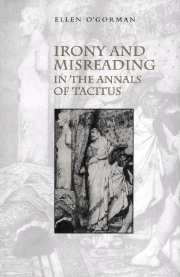Book contents
- Frontmatter
- Contents
- Dedication
- Preface
- 1 Introduction: irony, history, reading
- 2 Imperium sine fine:problems of definition in Annals 1
- 3 Germanicus and the reader in the text
- 4 Reading Tiberius at face value
- 5 Obliteration and the literate emperor
- 6 The empress's plot
- 7 Ghostwriting the emperor Nero
- 8 Conclusion: the end of history
- Bibliography
- General index
- Index locorum
4 - Reading Tiberius at face value
Published online by Cambridge University Press: 30 September 2009
- Frontmatter
- Contents
- Dedication
- Preface
- 1 Introduction: irony, history, reading
- 2 Imperium sine fine:problems of definition in Annals 1
- 3 Germanicus and the reader in the text
- 4 Reading Tiberius at face value
- 5 Obliteration and the literate emperor
- 6 The empress's plot
- 7 Ghostwriting the emperor Nero
- 8 Conclusion: the end of history
- Bibliography
- General index
- Index locorum
Summary
In the preceding chapters I have concentrated on readers of political and dynastic history in the narrative of the Annals, those who draw out continuity or discontinuity between political structures and persons in the past and present. The readers examined in this chapter exercise or try to avoid exercising their interpretative skills on the emperor Tiberius, who in turn subjects his contemporaries to a hostile scrutiny. Tiberius is at the centre of Tacitean misreading and obscurity, so much so that he has often been taken as an oblique self-portrait of the historian. What is represented as the prime obstacle to reading Tiberius, what we could therefore term the predominant element of Tiberius' representation, is his repression and dissimulation of thoughts and emotions. This feature is so pervasive in Tiberius' representation that it conjures up a fantasy of the ‘real’ Tiberius, a fantasy for Tacitus' readers which threatens to be a nightmare for the people of Tiberian Rome. What I will be arguing in this chapter is that Tiberius represents the Tacitean narrative, in that the difficulties of reading the princeps are a dramatisation of the difficulties of reading the Annals.
These difficulties, as I outlined in the introduction, have to do with reading a surface which continually calls attention to itself as surface, thereby predicating hidden depths and exciting the desire to plumb those depths, uncovering hidden truth. Hence any reading of the surface, however coherent and plausible, is disrupted by the uncertainty of how that reading measures up to the hidden truth.
- Type
- Chapter
- Information
- Irony and Misreading in the Annals of Tacitus , pp. 78 - 105Publisher: Cambridge University PressPrint publication year: 2000



